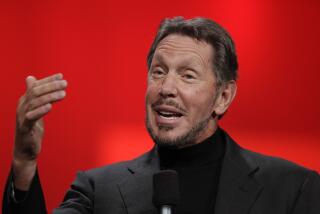Vivendi Bidder Singles Out Diller for His Dual Role
Can a single executive run two multibillion-dollar media companies at the same time?
That is the question being raised by oil tycoon Marvin Davis as he tries to curry favor for his unsolicited $13-billion bid for Vivendi Universal’s U.S. entertainment group.
As part of their sales pitch, Davis representatives contend that the entertainment group, which includes Universal studios, cable channels, the world’s largest recording company and theme parks, deserves a full-time chief executive.
It’s a not-so-subtle way of calling attention to the fact that Barry Diller, its current co-CEO, has another job.
“The problem is corporate management isn’t focused on running the entertainment divisions, and that’s what Marvin could bring to the equation,” said a source close to Davis. “It’s also one reason the entertainment assets don’t command the value they should for Vivendi.”
In addition to his role at Vivendi, Diller is chief executive of USA Interactive, a fast-growing electronic retailing concern that owns Ticketmaster, Expedia and other Web sites.
Davis envisions installing new leadership at Universal that would oversee the existing divisional management team, fix up the properties and take the company public in three or four years.
Diller would be replaced by a seasoned entertainment chief executive, with former Universal Pictures co-Chairman Brian Mulligan -- the architect of Davis’ deal -- playing a top management role as chief financial or chief operating officer, according to the Davis representative.
“Barry is impressive, but by his own admission, Vivendi is his No. 2 priority,” said the source.
Diller would not comment.
For their part, USA Interactive investors have tolerated Diller’s dual role over the last four months because of the media mogul’s solid financial track record and his assurances that the entertainment duties are a part-time, and temporary, affair.
Just this week, Diller said at a travel convention that his role with Vivendi will end within the next four to eight months.
Nonetheless, there continues to be widespread speculation that if Vivendi spins off its U.S. entertainment group, Diller would be left in charge.
Diller and Vivendi’s new chief executive, Jean-Rene Fourtou, have been working on a plan under which the entertainment group could shoulder some of its Paris-based parent’s staggering $19 billion in debt, possibly as part of a public offering next year.
Worried about the prospect that Diller might get sucked deeper into Universal, investors in USA Interactive drove the company’s shares down nearly 5% Friday after a one-month run-up of 83%. They closed on Nasdaq at $28.34, down $1.33.
Analysts said the decline could stem from concerns that Diller might be forced to use USAI stock as a currency to make a counterbid for the Vivendi entertainment assets he now manages.
Still, some large USAI shareholders said Friday that their support of Diller had not wavered. They dismissed Davis’ bid for Universal as unfinanced and therefore not serious.
“This is a pipe dream,” said one Wall Street source who requested anonymity. “Davis doesn’t stand a chance.”
Even if Diller is compelled to try to run both empires at once, some say he’s equipped to pull it off.
“He’s capable of doing anything he sets out to do,” said Sumner Redstone, the chairman and chief executive of Viacom Inc., and a close friend of Davis who beat Diller in a bitter bidding war for Paramount Communications in the mid-1990s. “He wouldn’t look at anything as a part-time job.”
*
(BEGIN TEXT OF INFOBOX)
Bidding but Not Always Buying
Billionaire Marvin Davis’ unsolicited $13-billion bid for Vivendi Universal’s U.S. entertainment assets has been greeted with skepticism by some who wonder whether the notorious corporate “tire kicker” is serious. A look at some of the oilman’s business deals -- including some that fell through:
Deal Makers
1981: Sells 20th Century Fox four years after taking over and nets a $350-million profit.
1987: Sells Beverly Hills Hotel for a $65-million profit.
2000: Nets an $80-million profit on the sale of Fox Plaza, a Century City skyscraper.
Deal Breakers
1977: Tries to buy major league baseball’s Oakland A’s, but the deal is blocked when the Oakland Coliseum sues.
1986-87: Bids to buy CBS for $3.75 billion and Resorts International for $200 million -- offers both rejected as being too low.
1988: A bid for the National Football League’s Dallas Cowboys fails as negotiations falter.
1989-92: Proposes to buy Northwest, United and Continental airlines but is either outbid or rebuffed in the unrelated offers.
1999: Withdraws a bid to put an NFL team in Hollywood Park. Insiders said he found the deal too costly.
August: US Airways rejects Davis’ offer of refinancing help.
-- Graphics research by
Times staff librarian John Jackson
More to Read
The biggest entertainment stories
Get our big stories about Hollywood, film, television, music, arts, culture and more right in your inbox as soon as they publish.
You may occasionally receive promotional content from the Los Angeles Times.










